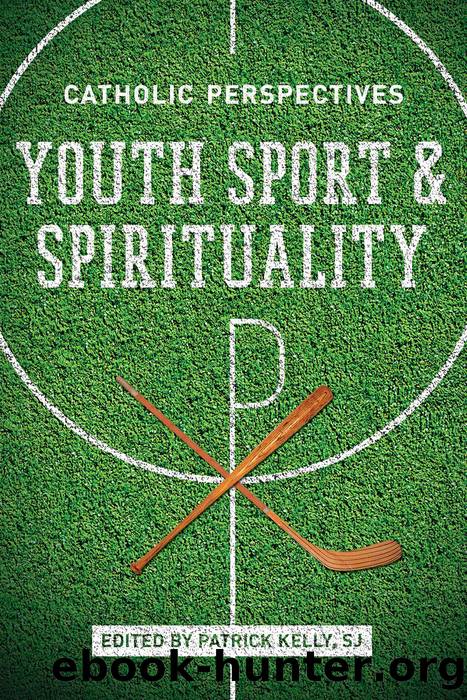Youth Sport and Spirituality by Unknown

Author:Unknown
Language: eng
Format: epub
Publisher: University of Notre Dame Press
Published: 2017-01-15T00:00:00+00:00
NOTES
1. John Paul II, âPope to Milan Football Team,â LâOsservatore Romano, May 28, 1979, 4.
2. John Paul II, âDuring the Time of the Jubilee: The Face and Soul of Sport,â October 28, 2000, available at http://w2.vatican.va/content/john-paul-ii/en/speeches/2000/oct-dec/documents/hf_jp-ii_spe_20001028_jubilsport.html.
3. John Paul II, âThe Most Authentic Dimension of Sport,â LâOsservatore Romano, April 24, 1984, 3.
4. Quoted in William Hogan, âSin and Sport,â in Motivations in Play, Games and Sports, ed. Ralph Slovenko and James Knight, 121â47 (Springfield, IL: Charles C. Thomas, 1967), 124â25, emphasis in original.
5. Bill Pennington, âAs Team Sports Conflict, Some Parents Rebel,â New York Times, November 12, 2003, sec. A, p. 1, and sec. C, p. 16.
6. Ibid.
7. Bill Pennington, âDoctors See a Big Rise in Overuse Injuries for Young Athletes,â New York Times, February 22, 2005, available at http://www.nytimes.com.
8. Phil Jackson and Hugh Delehanty, Sacred Hoops: Spiritual Lessons of a Hardwood Warrior (New York: Hyperion, 1995), 90.
9. Mihaly Csikszentmihalyi, âPlay and Intrinsic Rewards,â The Journal of Humanistic Psychology 15, no. 3 (Summer 1975): 41â63, at 42.
10. Ibid., 54â55.
11. Mihaly Csikszentmihalyi, Flow: The Psychology of Optimal Experience (New York: Harper and Row, 1990), 46.
12. Quoted in Michael Murphy and Rhea White, In the Zone: Transcendent Experiences in Sport (New York: Penguin Books, 1995), 22.
13. Quoted in Mihaly Csikszentmihalyi, âPlay and Intrinsic Rewards,â 47.
14. A person can be adversely affected even if he begins thinking about himself when an activity is going very well. The high school basketball player quoted earlier seems to grasp this point well. As he puts it, âWhen I get hot in a game ⦠Like I said, you donât think about it at all. If you step back and think about why you are so hot all of a sudden you get creamedâ (in Csikszentmihalyi, âPlay and Intrinsic Rewards,â 46). This element of the flow experience is very interesting, because it suggests that when a person is playing his best, he isnât really thinking about himself at all.
15. Csikszentmihalyi, Flow, 65â66.
16. Ibid., 64.
17. Mihaly Csikszentmihalyi, Beyond Boredom and Anxiety: The Experience of Play in Work and Games (San Francisco: Jossey Bass Publishers, 1975), 92 and 95.
18. Jackson and Delehanty, Sacred Hoops, 89.
19. Ibid., 91.
20. Mihaly Csikszentmihalyi, The Evolving Self (New York: HarperCollins, 1993), 219.
21. Csikszentmihalyi, Flow, 89â90.
22. Lynne Belaief, âMeanings of the Body,â The Journal of the Philosophy of Sport 4 (1977): 50â67, at 59.
23. Ibid., 62.
24. David L. Fleming, SJ, Draw Me Into Your Friendship, The Spiritual Exercises: A Literal Translation and Contemporary Reading (St. Louis, MO: Institute of Jesuit Sources, 1996), 113. This quotation is taken from Flemingâs contemporary reading of the literal text of Ignatiusâs Exercises.
25. Hugo Rahner, Man at Play (New York: Herder and Herder, 1967), 57â58.
26. I am describing the phenomenon of sports performance, and I am using a dramatic instance, where large amounts of money and fame are involved, to make a point. But such concentration would be needed at other levels of sport as well. If the junior high school basketball player thinks about how she will be well liked or popular by making a free throw, she might tighten up and miss the shot.
Download
This site does not store any files on its server. We only index and link to content provided by other sites. Please contact the content providers to delete copyright contents if any and email us, we'll remove relevant links or contents immediately.
The Harvest: Taken by M.A. Church(1918)
Many Waters by Madeleine L'engle(1897)
The King James Study Bible by Thomas Nelson(1829)
Becoming Kareem by Kareem Abdul-Jabbar(1775)
A Prophet with Honor by William C. Martin(1723)
The Last Days of Jesus by Bill O'Reilly(1598)
Ethics 101 by John C. Maxwell(1546)
No God But God by Reza Aslan(1544)
The Boy on the Wooden Box by Leon Leyson(1524)
Chicken Soup for the Teenage Soul on Tough Stuff by Jack Canfield(1513)
Seasons of Splendour by Madhur Jaffrey(1472)
Chicken Soup for the Teenage Soul III by Jack Canfield(1389)
Devlok with Devdutt Pattanaik 2 by Devdutt Pattanaik(1262)
Burpo, Todd - Heaven Is for Real by Burpo Todd(1251)
King James Study Bible by Thomas Nelson(1236)
Heaven Is for Real: A Little Boy's Astounding Story of His Trip to Heaven and Back by Todd Burpo(1227)
Great Horse Stories by Rebecca E. Ondov(1225)
Words in the Dust by Trent Reedy(1190)
Kindertransport by Olga Levy Drucker(1167)
